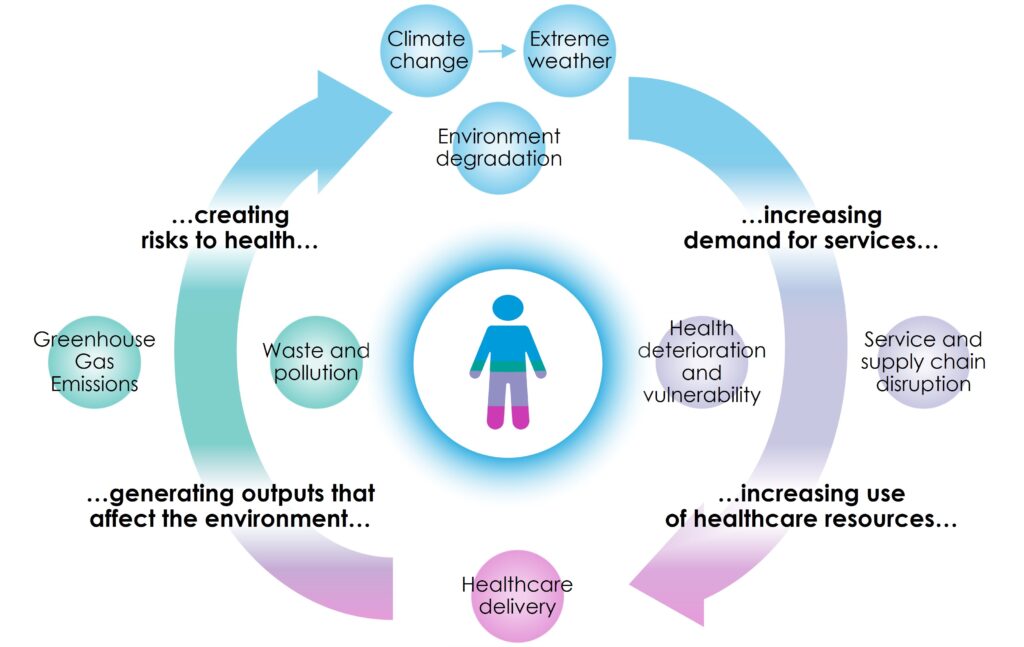
Our health is inextricably linked to the health of the environment and the planet. This is why the climate and nature crises are a health crisis: climate change and environmental degradation exacerbate existing health conditions, create new health challenges, worsen population health, drive health inequalities, and, through extreme weather events, result in harm and disruption to day-to-day healthcare provision, particularly for the most vulnerable.
Click the sections below the diagram to find out how the health service contributes to climate change, and how a better environment can improve health. If you are unsure what a phrase or abbreviation means, click for a glossary of commonly-used terms.
-
What is Climate Change and Environmental Degradation?
What is Climate Change and Environmental Degradation?
Climate Change occurs when the atmosphere, oceans and other "ecosystems" are no longer able to maintain a balance. In the case of modern anthropogenic (man-made) climate change, release of greenhouse gases means our planet is unable to maintain its usual average temperatures - this means the planet is warming up.
While warming temperatures might seem like a good thing, we are increasingly likely to see extremes - summer heatwaves and droughts, severe flooding, more-frequent and more-powerful storms. These will affect our health and how we live.
Environmental degradation is where natural systems can not cope with the levels of pollution, resulting in ecosystems no longer supporting life in the same way - polluted water ways, particulate matter in the air, more acidic oceans, and nutrient-poor soils are some examples.
-
Why does the environment matter to health?
Why does the environment matter to health?
Our health is inextricably linked to the health of the environment and the planet.
A warming planet means more energy in the atmosphere, leading to extreme weather.
Different diseases will begin to appear and take hold in the UK, as different species migrate with the changing climate.
Polluted water and air create additional risks to our health and wellbeing.
Growing nutritious food may become harder, and importing it and other supplies vital to our health from around the globe may become more difficult.
These, and other factors, are why the climate and nature crises are a health crisis: climate change and environmental degradation exacerbate existing health conditions, create new health challenges, worsen population health, drive health inequalities, and, through extreme weather events, result in harm and disruption to day-to-day healthcare provision, particularly for the most vulnerable.
-
How do healthcare organisations contribute to Climate Change?
How do healthcare organisations contribute to Climate Change?
The NHS in BLMK contributed 324,000 tonnes of CO2e in 2019/20. This is the equivalent to the emissions of a small petrol car driving around the Earth more than 60,000 times.
The main sources of greenhouse gas emissions from the NHS come from:
- Production, transport and disposal of medicines and chemicals
- Supply of equipment (medical and non-medical)
- Food and catering
- Energy
- Travel and transport (including staff commuting, business and patient travel)
- Medical gases such as anaesthetics and propellants in inhalers.
-
What can we do about it?
What can we do about it?
BLMK ICB and partners of the ICS have committed to achieving net zero and improving environmental sustainability. Visit the BLMK Green Plan (2025-2032) pages.
The commitments include:
- Reducing the use of volatile anaesthetics, which are powerful greenhouse gases.
- Improving the efficiency of buildings and increasing the use of renewable energy
- Moving to more-sustainable asthma inhalers
- Minimising the amount of travel needed by patients, staff and suppliers
- Reducing the amount of single-use plastic used in healthcare
- Encouraging a shift to lower-carbon diets
- Supporting an increase in active travel and public transport
According to a 2023 Health Impact Assessment report for BLMK, climate change and pollution are having a direct impact on the health of patients, residents and staff now. Download the Health Impact Assessment to find out more about how environmental sustainability can help improve health and wellbeing.
The main areas highlighted by the report were:
- Climate change and environmental issues such as air pollution and high-carbon diets are causing ill health and death in Bedfordshire, Luton and Milton Keynes and beyond.
- Improving air quality can reduce the risks of respiratory illnesses, stroke, cardio-vascular disease, dementia and developmental illnesses in children.
- Moving to lower-carbon diets such as the EatWell plate can reduce the risk of excess weight, cancer, and diabetes
- The health and care system should prepare for climate change and build resilience, including for its workforce, buildings, equipment and processes.
- Improving environmental sustainability of healthcare can support the goals of improving health, care quality and financial efficiency.

